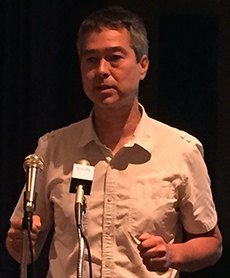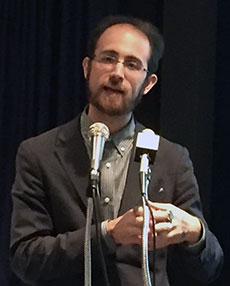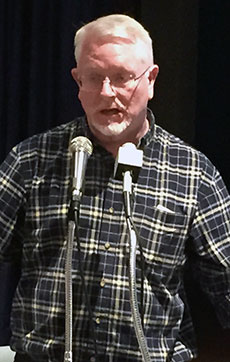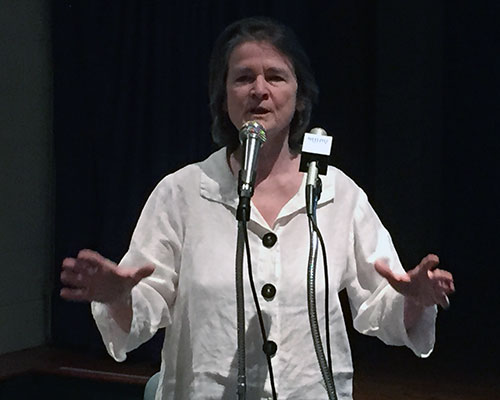Cathy Buckley, chair of the Massachusetts Sierra Club, was one of the speakers at a Haverhill Environmental Forum last month at Haverhill Public Library.

Nathan Phillips, executive committee, Massachusetts Sierra Club, and professor of Earth and Environment, Boston University.
While burning natural gas to create heat and electricity is considered far cleaner than burning coal or oil, experts say, unburned gas poses a significant environmental threat.
This is one reason a panel of environmentalists who gathered in Haverhill last month are concerned about hundreds of pipeline leaks in the Merrimack Valley alone. Within WHAV’s primary listening area, Haverhill topped the list with 104 unrepaired gas leaks, followed by 84 in Methuen, 57 in Andover and 23 in Groveland. Old cast iron pipes, dating back to the 1860s, are the sources of leaks, said Nathan Phillips, executive committee, Massachusetts Sierra Club, and professor of Earth and Environment, Boston University.
“So, it’s no big mystery we have this old, aging infrastructure, and we know the leaks are concentrated more on these pipes under the streets that have the cast iron infrastructure,” he said. Studies confirm gas found in the atmosphere comes from pipeline leaks rather than naturally occurring sources because it has a heavier carbon dioxide isotope and also contains ethane, Phillips said.

Joel Wool, environmental advocate, Clean Water Action.
Besides environmental and explosive risks of leaking gas, the wasted fuel contributes to utility ratepayer bills, including paying for the increased cost of building additional pipelines. Phillips said the value of natural gas lost is about $90 million annually.
Natural gas, primarily methane, is a potent greenhouse gas, trapping heat in the atmosphere and contributing to global warming. In fact, according to the U.S. Environmental Protection Agency (EPA), natural gas “is more efficient at trapping radiation” than carbon dioxide. The effects of global warming are increased severity of storms and flooding—the result of melting of ice increasing sea levels, said Cathy Buckley, chair of the Massachusetts Sierra Club. She said oceans—“the blood circulation of the planet”—absorb 90 percent of heat energy.
Joel Wool, environmental advocate, Clean Water Action, told the audience gathered at the Haverhill Public Library, the state is at a crossroads.

Moderator Richard Smyth of the Universalist Unitarian Church of Haverhill.
“Massachusetts is going through an incredible energy and economic transition,” he said. The state is losing three coal-fired power plants and one nuclear plant. “In many ways a very good thing for public health and the environment. This is a toxic form of power. It puts lots of mercury in the atmosphere,” he said. To make up for the lost power, however, the public has to make the case for clean energy alternatives such as solar and offshore wind or else end up with polluting fracked gas or Canadian hydropower. Wool and other speakers noted the legislature is reviewing energy legislation this year and must hear from citizens. He acknowledged the choices also have an impact on the economy and jobs, but noted solar power has already added 15,000 jobs in the state.
Home Energy Efficiency Team (HEET), a Cambridge-based non-profit, compiled a list of gas leaks in the area. To view it, visit http://www.heetma.org/squeaky-leak/natural-gas-leaks-maps/.
The Haverhill Environmental Forum was moderated by Richard Smyth of the Universalist Unitarian Church of Haverhill. WHAV will rebroadcast the forum in its entirety in place of the Open Mike Show, Monday night, beginning at 6:30 p.m.

